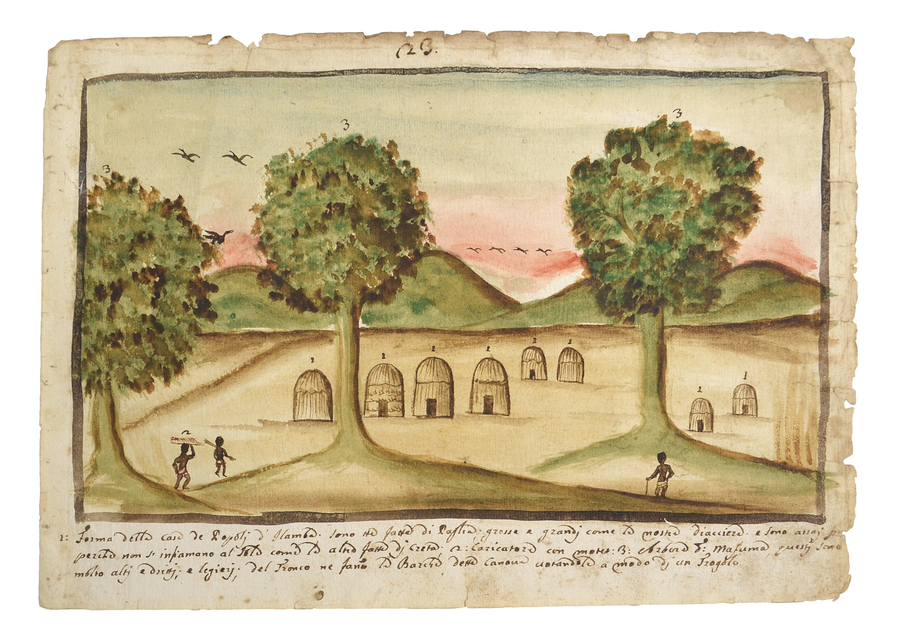PW023: Houses of the people of Ilamba
1: Forma delle case de Popoli d’Ilamba.1 Sono t[u]tte fatte di Paglia; grosse e grandi come le nostre diacciere2 e sono assai f[atte] perche non s’infiamano al Sole come le altre fatte di creta; 2: caricatore con motet3 3: Arbore d: Mafuma4 quesi sono molto alti e dritti; e legieri; del Tronco ne fan[n]o le Barche dette Canove5 votandole a modo di un Trogolo
1: Shape of the houses of the peoples of Ilamba. They are all made of Straw, as wide and tall as our icehouses and are made this way because they do not to catch fire in the sun as the others made of clay; 2: carrier with a motet 3: tree called mafuma, these are very tall and straight, as well as light; they make boats called canova from their trunks by emptying them as a trough
- 1About Ilamba see Linda Marinda Heywood and John Kelly Thornton, Central Africans, Atlantic Creoles, and the foundation of the Americas, 1585-1660 (Cambridge: Cambridge University Prgess, 2007), 88. It is between the Kwanza and Bengo, inland of Luanda, north of the Kwanza. Cavazzi mentions Ilamba in the Alraldi Manuscript, see Cavazzi, Missione Evangelica: vol. B, 582.
- 2Giasséra is a Tuscan term see Antonio Tiraboschi, Vocabolario dei dialetti bergamaschi antichi e moderni compilato da Antonio Tiraboschi (Bergamo: Tip. F. lli Bolis, 1873).
- 3From Kikongo motete or mutete: headloads or bundles carried on the head, often in woven palm leaf baskets that also served as units of measure. See Latin entry for fascis: bundle in Vocabularium, 37. See also Bernardo da Canicatti, Diccionario da lingua Bunda ou Angolense, explicada na Portugueza e Latina, composta por Fr. B. M. de Cannecattim, Capuchinho Italiano da Provincia di Palermo, Missionario Apostolico e Prefeito das Missoes de Angola, e Congo (Lisbon: na Impressao Regia, 1804). See also description in Caltanisetta, Relatione del viaggio e missione di Congo, f. 9v.
- 4From Kimbundu mfuma or lusitanized as mafumeira: kapok [Ceiba pentadra]. See Girolamo Merolla da Sorrento and Angelo Piccardo, Breve, e svccinta relatione del viaggio nel regno di Congo nell' Africa meridionale, fatto dal P. Girolamo Merolla da Sorrento . . . Continente variati clima, arie, animali, fiumi, frutti, vestimenti con proprie figure, diuersita di costumi, e di viueri per l'vso humano (Naples: Per F. Mollo, 1692), 192. See also Lorenzo da Lucca in Jean Cuvelier and Lorenzo da Lucca, Relations sur le Congo du père Laurent de Lucques (1700-1717) (Brussels: Institut Royal Colonial Belge, 1953), 271. See also Giuseppe da Modena in Calogero Piazza, “Une relazione inedita sulle missioni dei minori cappuccini in Africa degli inizi del Settecento 3,” Italia Francescana 48, no. 1 (1973): 23, 94-95.
- 5From the Portuguese canoa: canoe.

Add new comment